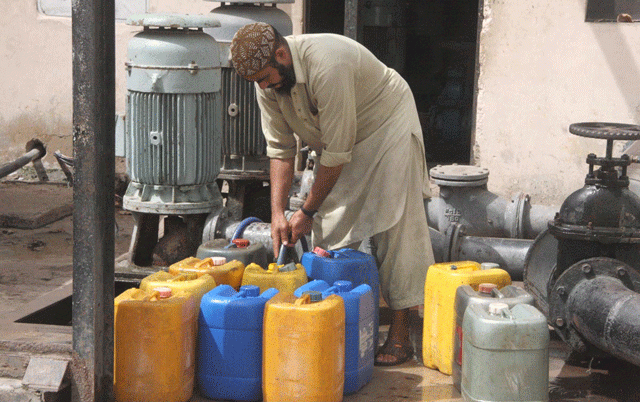We deserve water share for accommodating people from all provinces: CM
1,200 cusecs from Indus is required for K-IV project, says irrigation secretary

A man fills cans with water at a pumping station in Lyari. According to Irrigation Secretary Jamal Shah, 1,200 cusecs of water was required from River Indus for the K-IV project in Karachi. PHOTO: ONLINE
Chief Minister Murad Ali Shah said this while presiding over a preparatory meeting at the New Secretariat in connection with the Council of Common Interests (CCI) meeting to be held in Islamabad on Friday.
Law Minister Ziaul Hassan Lanjar, Special Assistant to CM on Inter-Provincial Coordination (IPC) Taimore Talpur, Chief Secretary Rizwan Memon, Principal Secretary Sohail Rajput, Irrigation Secretary Syed Jamal Shah, Energy Secretary Agha Wasif, IPC Secretary Aijaz Mangi and Forest Secretary Manzoor Shaikh attended the meeting.
'Sindh is suffering from more than 50% water shortage'
When the Water Accord of 1991 was signed by all the four provinces, the federal government allocated a certain share of water for Islamabad and Rawalpindi. Sindh protested that being the tail-enders, people of the province will suffer.
At that time, the federal government had assured that 1,200 cusecs will be given to Karachi. This has yet to happen. Speaking in reference to this violation of its claims on part of the federal government, the CM said that all the provinces should share Karachi’s water requirement of 1,200 cusecs for domestic use the way the provincial governments did for carving out the share for Islamabad and Rawalpindi.
According to Irrigation Secretary Jamal Shah, 1,200 cusecs of water was required from River Indus for the K-IV project in Karachi. He added that the requirement would rise to 1,800 cusecs by 2020 and 2,400 cusecs by 2025.
Powerless Lahore: City suffers through serious water shortage
Talking about short supply of water in Pat Feeder and Kirthar Canals that are supposed to provide water to Balochistan, the irrigation secretary said the claim of Balochistan is not justified as there is no legal provision under the 1991 Water Accord for monetary compensation on account of alleged short supply of water.
On this, the chief minister said he is ready to initiate third-party monitoring with the consensus of both the provinces. Jamal also presented a report to the chief minister, stating that 83 unauthorised outlets in Guddu Barrage command diverted water to Balochistan, which is in addition to their share.
Jamal further suggested that to ensure tail-enders rights, a new law should be introduced that enables the establishment of special ‘water courts’.
Sindh barrages facing 40% water shortage
The chief minister also said that effluent coming from Balochistan and Punjab has destroyed the lands in Kamber-Shahdadkot and Ghotki districts. He suggested that this should be put on the agenda for the meeting that no untreated effluent would be accepted. Therefore, he said, there should be a clear policy that effluent draining down to Sindh be treated first.
Gas supply in fields
Talking about the supply of gas to areas located within five-kilometre radius of gas-producing fields, Energy Secretary Agha Wasif said there are 347 villages located near gas-producing fields. The federal government is of the view that the provincial government should share the expenditures, he said, adding that the total cost of providing gas connections to the 347 villages would be Rs3.591 billion. Of this amount, the Sui Southern Gas Company (SSGC) would invest Rs747 million while the remaining amount of Rs2.844 billion would be borne by the Sindh government.
WASA blames HESCO for water shortage in Hyderabad
On this, the chief minister reiterated his earlier stand that in pursuance of Supreme Court’s judgment and the prime minister's directives, the federal government should bear the total cost of laying gas pipelines for villages located within five-kilometre radius of gas-producing fields. He also said that he would manage to provide gas to other villages that are within the district of gas-producing fields.



















COMMENTS
Comments are moderated and generally will be posted if they are on-topic and not abusive.
For more information, please see our Comments FAQ